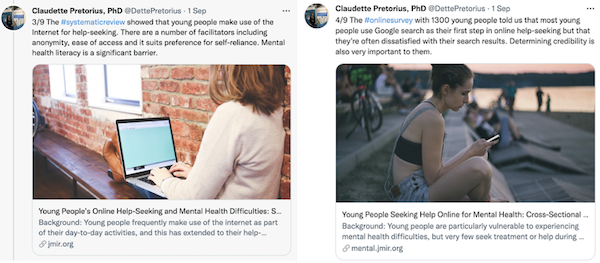
Seeking help is an important step in addressing mental health difficulties. Evidence suggests that positive help-seeking experiences contribute to an increased likelihood of future help-seeking and achieving improved outcomes. However, help-seeking is a complex process. Together with Claudette Pretorius, a post-doc and former PhD student with the HCI@UCD group, we are exploring how technology can support better help seeking experiences for young people experiencing mental health difficulties.
Key Collaborators: Claudette Pretorius
Publications (newest last):
Pretorius, C., Chambers, D. and Coyle, D. (2019). Young people’s online help-seeking and mental health difficulties: Systematic narrative review. Journal of medical Internet research, 21(11), p.e13873. (doi)
Pretorius, C., Chambers, D., Cowan, B. and Coyle, D. (2019) Young people seeking help online for mental health: cross-sectional survey study. JMIR mental health, 6(8), p.e13524. (doi)
Pretorius, C., McCashin, D., Kavanagh, N. and Coyle, D. (2020) April. Searching for mental health: a mixed-methods study of young people’s online help-seeking. In Proceedings of the 2020 CHI Conference on Human Factors in Computing Systems (pp. 1-13). (doi)
Pretorius C, Coyle D (2021) Young People’s Use of Digital Tools to Support Their Mental Health During Covid-19 Restrictions. Front. Digit. Health 3:763876. DOI: https://doi.org/10.3389/fdgth.2021.763876
Pretorius, C., McCashin, D., & Coyle, D. (2022). Supporting personal preferences and different levels of need in online help-seeking: a comparative study of help-seeking technologies for mental health. Human–Computer Interaction, 1-22. (doi)
Summary:
Our work began with a systematic narrative review of the barriers and facilitators young people experiences when seeking help online. We also gained a deeper understanding of young people’s experiences through a large-scale cross-sectional survey. Building on this, and through co-design with young people, we have developed and evaluated a series of interactive help-seeking prototypes and provide guidelines for the design of online help seeking tools. The design and evaluation of these prototypes is detailed in the 2020 and 2022 papers above.
Our research has emphasised the importance of four key design considerations: connectedness, accessible information, personalisation and a respect for autonomy, and immediacy. From a theoretical perspective we have developed a model of online help-seeking that combines previous theories of offline help-seeking, with needs based motivational theories, and information seeking theories. A formal paper on this theoretical work is currently in preparation.
This Twitter thread by Claudette provide a nice overview of her PhD work.
